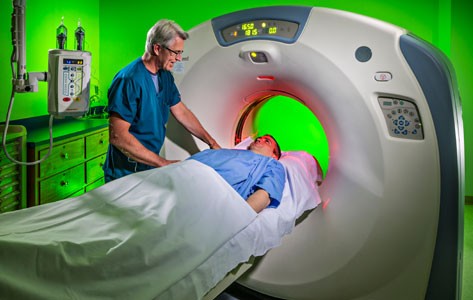Morristown Medical Center
Atlantic Health System Cancer Care's Multidisciplinary Thoracic Tumor Program offers state-of-the-art, minimally invasive diagnostic tests to pinpoint the location of a patient’s thoracic cancer and determine the best course of treatment.

Our lung cancer diagnostic services include:
- Computed tomography (CT) biopsy –
- during this one-hour procedure, a small sample of tissue from inside the body is obtained using the CT machine for guidance; this technique often saves the patient from having to undergo surgery to obtain tissue
- Flexible and rigid bronchoscopy –
- procedures utilizing an endoscope to look at the airways in the lungs; flexible bronchoscopy is usually done under local anesthesia; rigid bronchoscopy is done under general anesthesia
- Electromagnetic navigational bronchoscopy (ENB) –
- A minimally invasive technique that uses technology similar to global positioning systems (GPS) to biopsy lesions deep in the lungs that would be difficult or impossible to reach using traditional methods.
- Endobronchial ultrasound (EBUS) bronchoscopy –
- a minimally-invasive outpatient procedure using an innovative ultrasonic airway bronchoscope to detect lung cancer spread to lymph nodes for accurate lung cancer staging
- Endoscopic ultrasound (EUS) –
- a minimally-invasive outpatient procedure used to stage esophageal cancer by determining tumor thickness and evaluating if any cancer has spread to lymph nodes in the chest and abdomen
- Positron emission tomography (PET) and CT scan –
- are standard imaging tools that allow physicians to pinpoint the location of cancer in the body and provide detailed pictures of the location, size and shape of any cancerous growth; combining these tests allows doctors to diagnose cancer earlier and more accurately, resulting in quicker, more precise treatments for the patients
- Video-mediastinoscopy –
- this procedure uses a video camera to stage tumors in the lungs
Tumor staging
Once experts of the Multidisciplinary Thoracic Tumor Program have discovered that the patient has a tumor, they use a tumor staging system to gauge how advanced the cancer may be and determine the best treatments for the patient’s needs. Tumor staging measures the thickness of the tumor, the patient’s lymph node status, and whether the cancer has spread to other areas of the body.
Lung and thoracic cancer care services may vary by location. Please confirm when booking an appointment.
Locations
-
Morristown Medical Center
-
Helaine and Ike Heller Thoracic Lung Cancer Program
-
Carol G. Simon Cancer Center
100 Madison Avenue
Morristown, NJ 07960
- 973-644-4844
- Monday through Friday, 8:30am to 4:30pm
-
Carol G. Simon Cancer Center
-
Overlook Medical Center
-
Multidisciplinary Thoracic Tumor Program
-
Newton Medical Center
-
Oncology Services
-
Chilton Medical Center
-
Cancer Center
-
The Collins Pavilion
97 West Parkway
Pompton Plains, NJ 07444
- 973-831-5025
- Monday through Friday, 8:00am to 4:00pm
-
The Collins Pavilion
-
Hackettstown Medical Center
-
Joan Knechel Cancer Center
If you have questions about your care or treatment, please contact your physician or health care provider.

